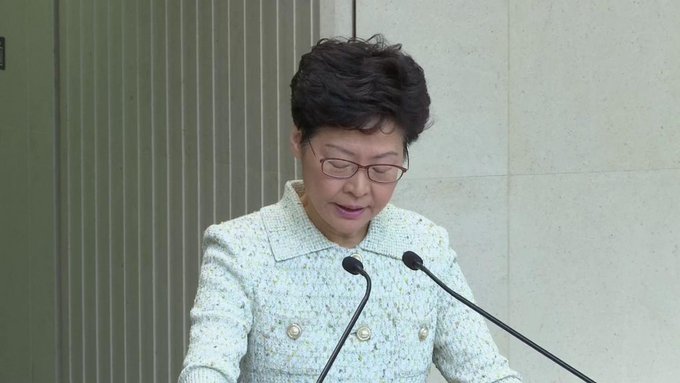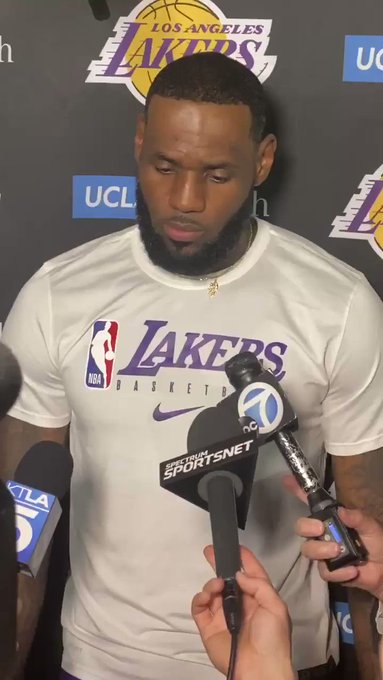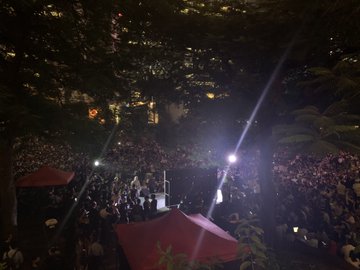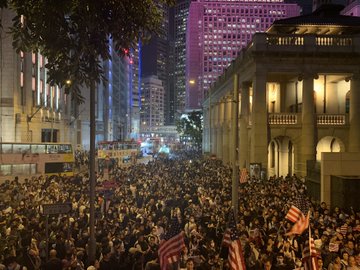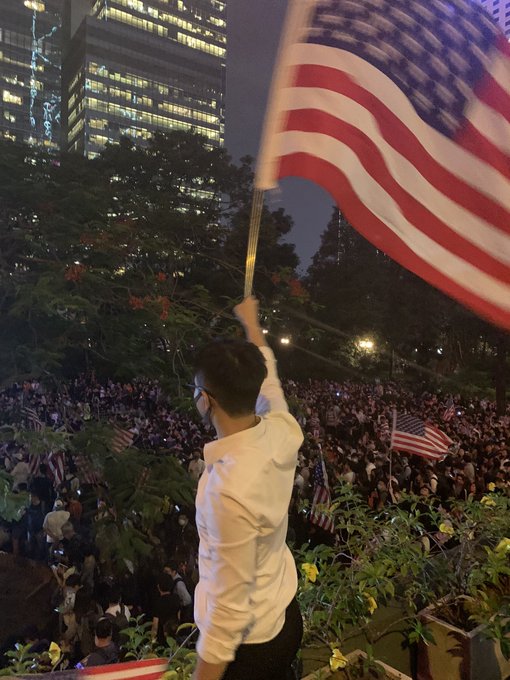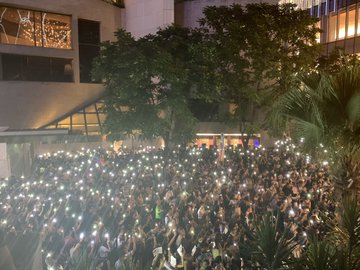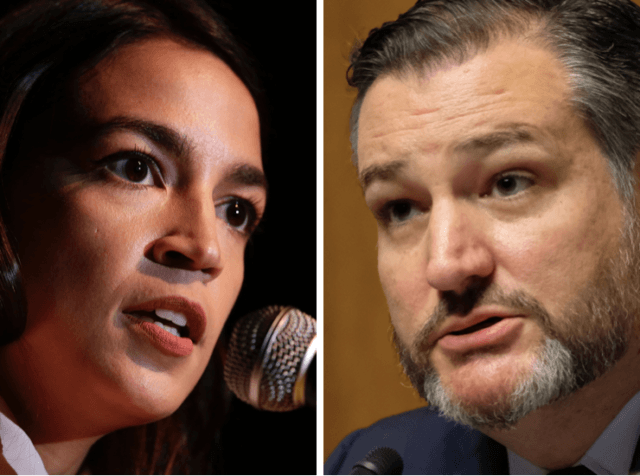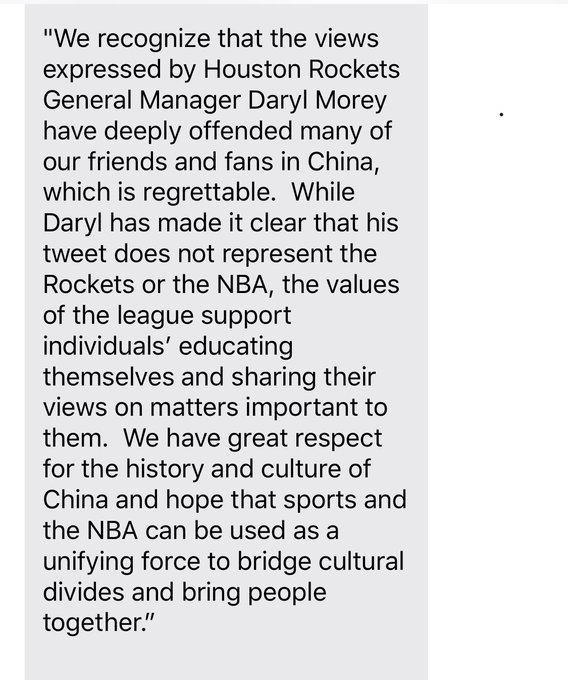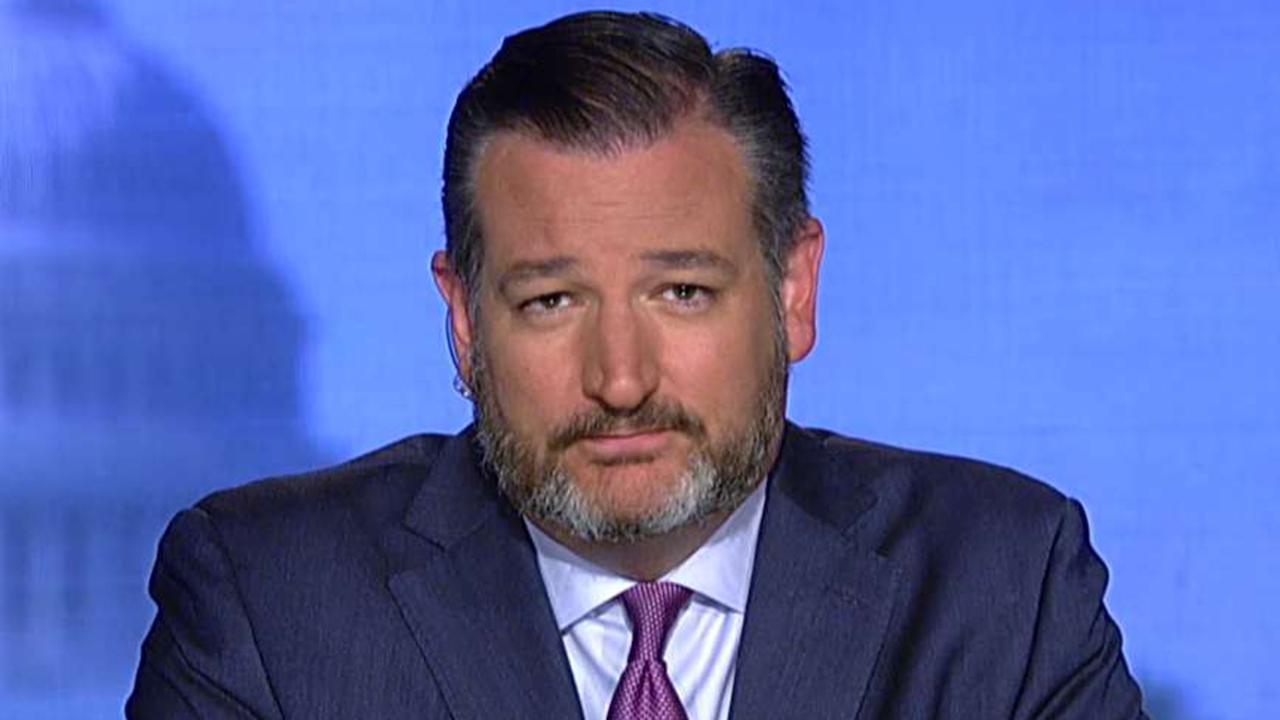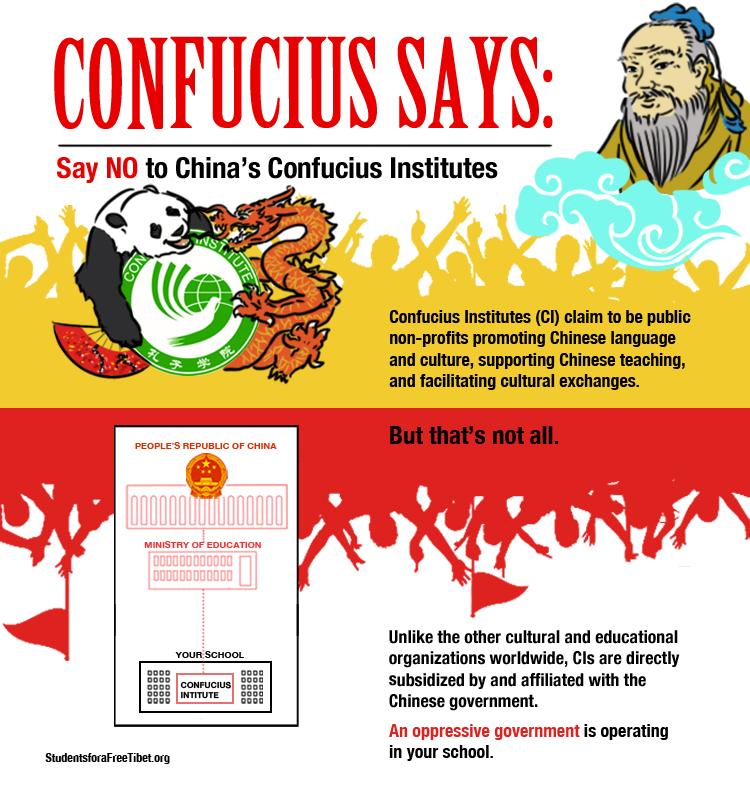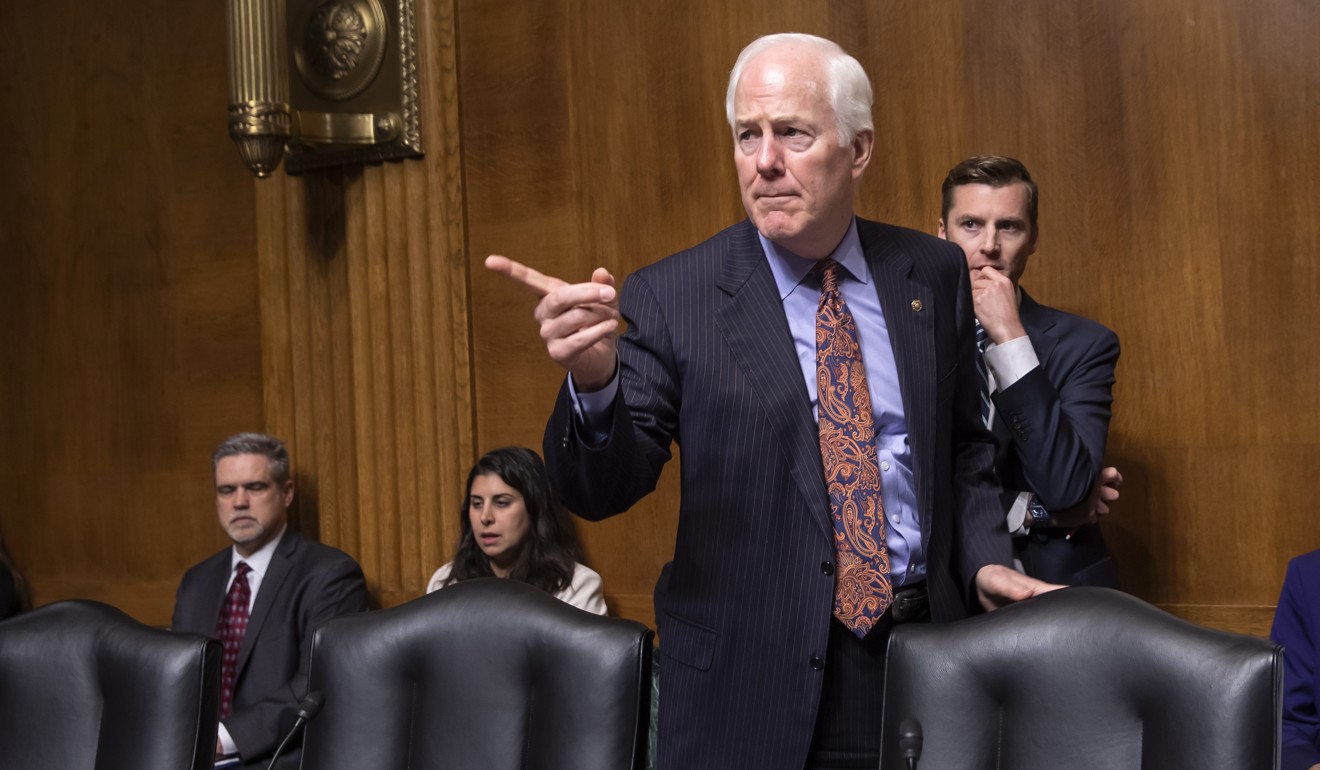By Edward Wong

Protesters rallying last month in Hong Kong.
HONG KONG — The Hong Kong protests at times seem like love fests with the United States. Depending on the day, demonstrators wave American flags or Uncle Sam recruitment posters, and even dress as Captain America, complete with shield.
The United States represents democracy, and the activists hope that maybe, just maybe, it will save Hong Kong.
Five months in, they are trying harder than ever to draw the United States into their movement.
The protesters are pressing Hong Kong officials and their overseers, the authoritarian Communist Party leaders of China, for greater democratic rights and rule-of-law in the autonomous territory.
The protesters are pressing Hong Kong officials and their overseers, the authoritarian Communist Party leaders of China, for greater democratic rights and rule-of-law in the autonomous territory.
As they see it, the Trump administration might be able to make demands of Chinese leaders or Hong Kong officials, especially because members of elite political circles want to maintain access to the United States.
Also, they note, the trade war with China, started by President Trump, is adding pressure over all on Xi Jinping.
For the American government, the protests are more complicated — a potential policy dilemma but also a potential point of leverage with Beijing and a way to channel American values to the rest of the world.
“The United States should continue to deter Beijing from use of force, maintain an unblinking eye on Hong Kong, and make Beijing pay a heavy reputational cost for curtailing the rights and freedoms of Hong Kong citizens,” said Ryan Hass, a former State Department and National Security Council official now at the Brookings Institution.
Yet, he added, “I worry that the protesters in Hong Kong risk misinterpreting American sympathy and support of their cause for expectation that the United States will shield them from Beijing’s heavy hand.”
 Hong Kong protesters see the United States as a potential savior in their quest for greater democratic rights.
Hong Kong protesters see the United States as a potential savior in their quest for greater democratic rights.
Also, they note, the trade war with China, started by President Trump, is adding pressure over all on Xi Jinping.
For the American government, the protests are more complicated — a potential policy dilemma but also a potential point of leverage with Beijing and a way to channel American values to the rest of the world.
“The United States should continue to deter Beijing from use of force, maintain an unblinking eye on Hong Kong, and make Beijing pay a heavy reputational cost for curtailing the rights and freedoms of Hong Kong citizens,” said Ryan Hass, a former State Department and National Security Council official now at the Brookings Institution.
Yet, he added, “I worry that the protesters in Hong Kong risk misinterpreting American sympathy and support of their cause for expectation that the United States will shield them from Beijing’s heavy hand.”
 Hong Kong protesters see the United States as a potential savior in their quest for greater democratic rights.
Hong Kong protesters see the United States as a potential savior in their quest for greater democratic rights.If the protesters are sending out a siren song, some American officials and lawmakers are answering it, eager to show their commitment to the cause.
Members of Congress have appeared in Hong Kong in public displays of solidarity.
Last month, Senator Ted Cruz, Republican of Texas, donned an all-black outfit, while Senator Josh Hawley, Republican of Missouri, posted photographs from a protest.
In Washington, Nancy Pelosi, the speaker of the House, has met with activists, pro-democracy politicians and Jimmy Lai, a publisher considered radioactive by Beijing.
In Washington, Nancy Pelosi, the speaker of the House, has met with activists, pro-democracy politicians and Jimmy Lai, a publisher considered radioactive by Beijing.
Vice President Mike Pence singled out Hong Kong as a beacon of liberty in a speech, saying, “We stand with you; we are inspired by you.”
And versions of a bill that would give support to the protesters are moving though Congress with bipartisan backing.
And versions of a bill that would give support to the protesters are moving though Congress with bipartisan backing.
The legislation, among other things, would allow the United States to impose economic sanctions and a travel ban on Hong Kong officials deemed responsible for human rights abuses.
“We hope this bill will pass,” said Selina Po, a 27-year-old protester wearing a mouth mask in the Admiralty neighborhood as she held up a sign with the bill’s name, the Hong Kong Human Rights and Democracy Act.
“We hope this bill will pass,” said Selina Po, a 27-year-old protester wearing a mouth mask in the Admiralty neighborhood as she held up a sign with the bill’s name, the Hong Kong Human Rights and Democracy Act.
“It’s our hope for winning this war. We’re trying all we can.”

Nancy Pelosi, the Speaker of the House, with Hong Kong activists at a news conference in September.
Greater involvement by Americans could give Beijing more ammunition in its propaganda effort to portray the pro-democracy movement as one stoked by foreign forces.
The Chinese government and state-run news organizations talk about “black hands” behind the unrest and spread conspiracy theories, including one centered on an American diplomat in Hong Kong who was photographed with activists in the lobby of the JW Marriott Hotel.
As the protests persist, American officials are watching for surges in violence and tracking the movement of People’s Liberation Army soldiers into Hong Kong.

Nancy Pelosi, the Speaker of the House, with Hong Kong activists at a news conference in September.
Greater involvement by Americans could give Beijing more ammunition in its propaganda effort to portray the pro-democracy movement as one stoked by foreign forces.
The Chinese government and state-run news organizations talk about “black hands” behind the unrest and spread conspiracy theories, including one centered on an American diplomat in Hong Kong who was photographed with activists in the lobby of the JW Marriott Hotel.
As the protests persist, American officials are watching for surges in violence and tracking the movement of People’s Liberation Army soldiers into Hong Kong.
Some are beseeching demonstrators to stick to nonviolent tactics, even in the face of police crackdowns and attacks by people sympathetic to Beijing.
On Sunday, at least six people were injured when a man with a knife who is believed to be against the democracy movement attacked a family at a shopping mall.
On Sunday, at least six people were injured when a man with a knife who is believed to be against the democracy movement attacked a family at a shopping mall.
In the melee, the attacker bit off part of the ear of a pro-democracy district council member, Andrew Chiu.
Two Democratic Congressmen, Tom Suozzi of New York and John Lewis of Georgia, the icon of the American civil rights movement, posted a video last month praising the activists for their “great work” and urging them to stick to nonviolence.
Whether the United States takes greater action on Hong Kong hinges on the unpredictable Trump.
Whether the United States takes greater action on Hong Kong hinges on the unpredictable Trump.
Administration officials and American lawmakers talk openly about checking the authoritarian impulses of the Chinese Communist Party.
But Trump rarely, if ever, mentions human rights and democracy, and he has not made strong statements on Hong Kong.
In June, he told Xi Jinping on a call that he would stay quiet on Hong Kong as long as Washington and Beijing were making progress on trade talks, according to an American official who spoke on the condition of anonymity.
In October, the Trump administration imposed some restrictions on Chinese companies and organizations for their roles in the mass repression of Muslims in mainland China, but Trump has held back from harsher actions for fear of upsetting the trade negotiations.
If a Hong Kong bill reaches Trump’s desk, analysts say, he might see it as merely a tool to wring concessions from China and could forego support if a trade agreement were close.
“Strong American bipartisan support for the peaceful protesters is not enough to override Trump’s transactional instincts,” Mr. Hass said.
In October, the Trump administration imposed some restrictions on Chinese companies and organizations for their roles in the mass repression of Muslims in mainland China, but Trump has held back from harsher actions for fear of upsetting the trade negotiations.
If a Hong Kong bill reaches Trump’s desk, analysts say, he might see it as merely a tool to wring concessions from China and could forego support if a trade agreement were close.
“Strong American bipartisan support for the peaceful protesters is not enough to override Trump’s transactional instincts,” Mr. Hass said.
“He does not look at Hong Kong through a values-based lens. And as long as he remains president, this outlook will limit America’s responses to developments in Hong Kong.”
Administration officials argue that Trump’s approach gives the United States a stronger hand in constraining Beijing on Hong Kong — even if it appears that Trump just wants to use the Chinese territory to his advantage.
“America expects Beijing to honor its commitments,” Mr. Pence said, “and President Trump has repeatedly made it clear it would be much harder for us to make a trade deal if the authorities resort to the use of violence against protesters in Hong Kong.”
In the eyes of Beijing, there has been no shortage of "provocations" by American politicians.
Administration officials argue that Trump’s approach gives the United States a stronger hand in constraining Beijing on Hong Kong — even if it appears that Trump just wants to use the Chinese territory to his advantage.
“America expects Beijing to honor its commitments,” Mr. Pence said, “and President Trump has repeatedly made it clear it would be much harder for us to make a trade deal if the authorities resort to the use of violence against protesters in Hong Kong.”
In the eyes of Beijing, there has been no shortage of "provocations" by American politicians.
On Oct. 22, Ms. Pelosi posted on Twitter a photograph of herself on Capitol Hill with three pro-democracy figures — Mr. Lai, Martin Lee and Janet Pang.
“My full support and admiration goes to those who have taken to the streets week after week in nonviolent protest to fight for democracy and the rule of law in #HongKong,” she wrote.

Nancy Pelosi
✔@SpeakerPelosi
So pleased to welcome Jimmy Lai, Martin Lee and Janet Pang to the U.S. Capitol. My full support and admiration goes to those who have taken to the streets week after week in non-violent protest to fight for democracy and the rule of law in #HongKong.
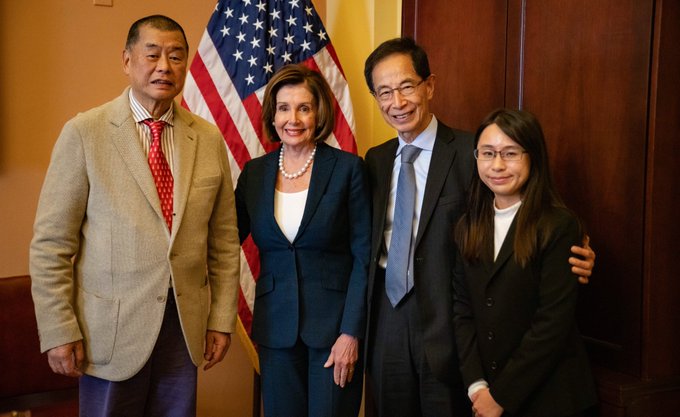
12.2K
12:04 AM - Oct 23, 2019
On Wednesday, Ms Pelosi slammed the decision by Hong Kong officials to bar the activist Joshua Wong from running in local elections.
“My full support and admiration goes to those who have taken to the streets week after week in nonviolent protest to fight for democracy and the rule of law in #HongKong,” she wrote.

Nancy Pelosi
✔@SpeakerPelosi
So pleased to welcome Jimmy Lai, Martin Lee and Janet Pang to the U.S. Capitol. My full support and admiration goes to those who have taken to the streets week after week in non-violent protest to fight for democracy and the rule of law in #HongKong.

12.2K
12:04 AM - Oct 23, 2019
On Wednesday, Ms Pelosi slammed the decision by Hong Kong officials to bar the activist Joshua Wong from running in local elections.
She said it was “another blow against rule of law in Hong Kong and the principle of ‘one country, two systems,’” referring to the foundation for the policy of autonomy that Britain and China agreed would be used to govern the territory.
Ms. Pelosi met Mr. Wong in Washington in September.
Ms. Pelosi met Mr. Wong in Washington in September.
Many demonstrators want American intervention and are focusing their attention on the legislation. The mere threat of American sanctions, they say, would give the movement greater voice with Beijing.
On Oct. 14, the night before a vote on the bill in the House of Representatives, protesters held a rally in the Central district to call for its passage.
On Oct. 14, the night before a vote on the bill in the House of Representatives, protesters held a rally in the Central district to call for its passage.
Tens of thousands attended, many of them carrying American flags.

American flags have become commonplace at the protests.

American flags have become commonplace at the protests.
“The power of Hong Kong people alone is limited, and we need other countries, such as the U.S., to help us counter China and keep ‘one country, two systems,’” said Eric Kwan, 32.
“I doubt the act can be an ultimate game-changer, but I think it is enough to give pressure to China.”
Along with allowing for sanctions, the legislation requires the State Department to review each year whether Hong Kong is still autonomous enough to qualify for the benefits of the 1992 Hong Kong Policy Act, which grants the city a trade and economic status different from that of mainland China.
Some American officials say the bill could harm Hong Kong residents if the United States determines that the territory no longer qualifies as an autonomous entity.
Along with allowing for sanctions, the legislation requires the State Department to review each year whether Hong Kong is still autonomous enough to qualify for the benefits of the 1992 Hong Kong Policy Act, which grants the city a trade and economic status different from that of mainland China.
Some American officials say the bill could harm Hong Kong residents if the United States determines that the territory no longer qualifies as an autonomous entity.
But the bill’s proponents defend its practical and symbolic value.
“Standing in support of Hong Kongers and preserving Hong Kong’s autonomy should be a priority of the United States and democracies worldwide,” said one of the bill’s sponsors, Senator Marco Rubio, Republican of Florida.
The bill passed the House by unanimous vote last month.
“Standing in support of Hong Kongers and preserving Hong Kong’s autonomy should be a priority of the United States and democracies worldwide,” said one of the bill’s sponsors, Senator Marco Rubio, Republican of Florida.
The bill passed the House by unanimous vote last month.
Though the Senate majority leader, Mitch McConnell, has not scheduled a vote yet, the measure is expected to pass that chamber easily, with a veto-proof majority.
Then Trump would have to decide whether to sign it into law.




 "To describe Hong Kong as a police state is totally unfounded."
"To describe Hong Kong as a police state is totally unfounded."